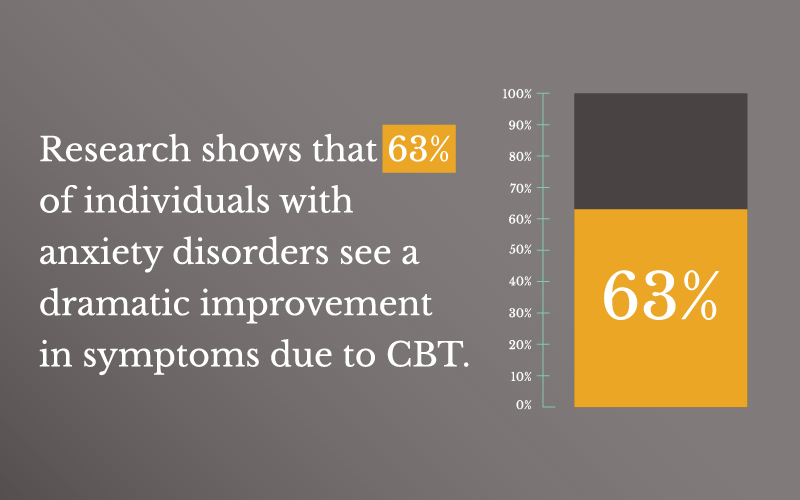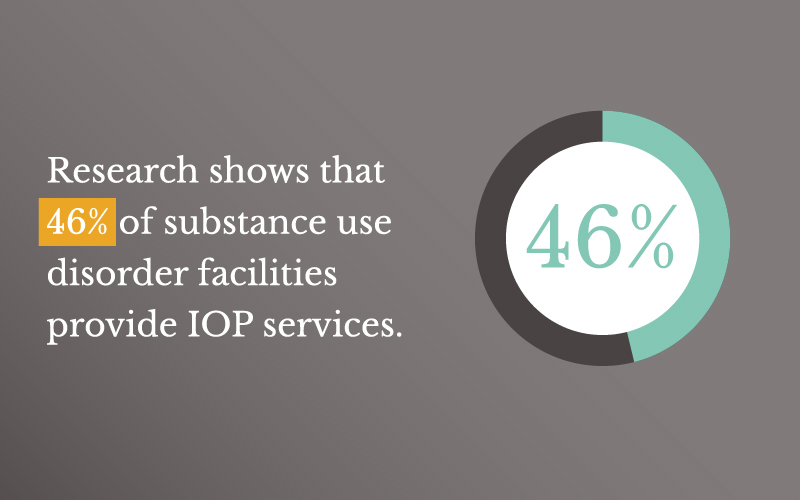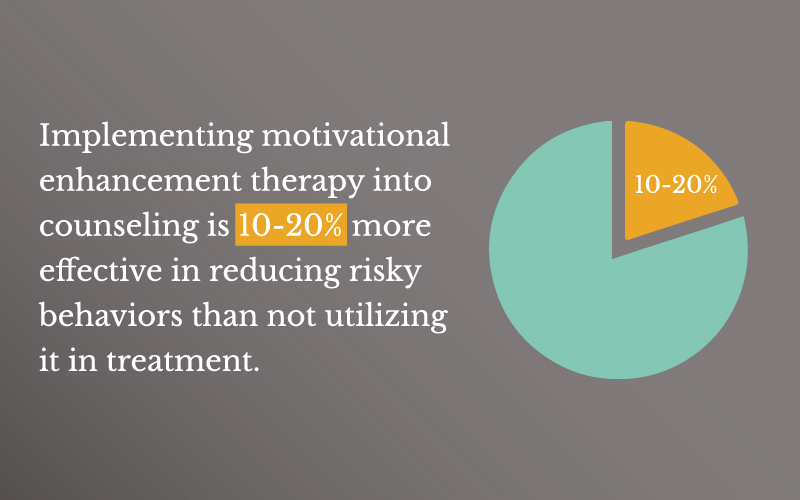What is Intensive Outpatient Mental Health Treatment?
What is intensive outpatient mental health treatment? How does it vary from other treatment modalities? Find out here.
Written and medically reviewed by the clinical team at Continuum Outpatient Center, including licensed therapists, addiction specialists, and medical professionals.
What is an Intensive Outpatient Program (IOP)?
If you or a loved one have been searching for addiction recovery support and/or mental healthcare services, you may be wondering, “what is intensive outpatient mental health treatment?”
An intensive outpatient program (IOP) for mental health is comprehensive treatment that provides people with more intensive support than traditional outpatient services but still allows them to live at home.
An IOP is designed for people who need a higher level of care than standard outpatient therapy but not the 24-hour supervision of inpatient or residential settings. These programs are often used for people with moderate to severe mental health challenges.

Benefits of an IOP
An IOP for mental health offers numerous benefits, as they provide a middle ground between standard outpatient care and more intensive inpatient options. The structured and comprehensive nature allows people to receive frequent and extended therapy sessions.
The inclusion of group therapy also facilitates peer support and shared experiences, creating a sense of community. An IOP offers flexibility, which enables people to maintain their daily responsibilities while still receiving the intensive care necessary for addressing moderate to severe mental health issues.
What is Intensive Outpatient Mental Health Treatment at Continuum Outpatient Center?
Our team at Continuum Outpatient Center can provide the flexibility needed in daily life while still providing supportive care.
Our main goal is to help people work through:
- Trauma
- Relapse risks
- Mental health or substance use symptoms that affect their lives
"At Continuum Outpatient Center, we assess the progress of patients in our IOP through a comprehensive and personalized approach. We begin with regular check-ins and evaluations where we track various indicators of progress, including changes in substance use patterns, improvements in mental health symptoms, and engagement in therapeutic activities. Our assessments are informed by evidence-based tools and standardized measures, allowing us to objectively monitor each patient's response to treatment and adjust their care plan accordingly. We also prioritize patient feedback and input, ensuring their perspectives on progress and challenges are heard and integrated into their ongoing treatment."
Larissa Valeriano, MS, LPC Tweet
What Conditions Can Be Treated in an Intensive Outpatient Program?
An intensive outpatient program can treat a wide range of mental health conditions. Some treatment centers also cater towards substance use disorders.
Depression
An IOP can provide structured support and therapeutic interventions for people experiencing symptoms of depression.
These symptoms may include:
- Persistent
- Low mood
- Fatigue
- Changes in appetite or sleep patterns
Anxiety Disorders
Anxiety disorders can be effectively treated in an IOP. These conditions include:
- Generalized anxiety disorder
- Social anxiety
- Panic disorder
- Other anxiety-related conditions
This is often through a combination of individual and group therapy.
Bipolar Disorder
An IOP may also offer support for people with bipolar disorder. This can look like providing:
- Mood stabilization services
- Medication management
- Coping strategies for managing both manic and depressive episodes
Post-Traumatic Stress Disorder (PTSD)
People with PTSD can benefit from trauma-focused therapies and support groups in an IOP, as these address symptoms related to traumatic experiences.
Obsessive-Compulsive Disorder (OCD)
An IOP may also include specialized interventions to help people manage obsessive thoughts and compulsive behaviors associated with OCD.
Substance Use Disorders
Eating Disorders
Conditions such as anorexia nervosa, bulimia nervosa, and binge-eating disorder can be addressed in an IOP with a focus on both medical and therapeutic interventions.
Personality Disorders
An intensive outpatient program can also provide support and skill-building for people with certain personality disorders. These disorders may include borderline personality disorder (BPD) and other conditions.
Trauma-Related Disorders
Beyond PTSD, an IOP can address a range of trauma-related conditions, providing trauma-informed therapies and support groups.
Dual Diagnosis
An intensive outpatient program is also well-suited for people with dual diagnoses. They offer integrated treatment to address both mental health and substance use challenges concurrently.
Adjustment Disorders
People struggling with stress and difficulties related to life changes, such as job loss or relationship issues, can benefit from the support and coping skills provided in an IOP.
What Is Intensive Outpatient Mental Health Treatment?: Note About Treatment
It’s important to note that the specific conditions treated in an IOP may vary depending on the program’s specialization and the expertise of the treatment team. An IOP is often flexible and can adapt their approach to meet the diverse needs of people seeking intensive mental health support.
Those interested in an IOP should consult with mental health professionals to determine the appropriateness of this level of care for their specific condition and circumstances. Our team at Continuum Outpatient Center will meet with you to determine the level of care you need.

What is the Typical Structure of an Intensive Outpatient Program?
The typical structure and schedule of an IOP for mental health may vary depending on the specific program. However, there are common elements shared among many programs, such as:
Frequency of Sessions
People in an IOP often attend therapy sessions multiple times a week, often ranging from three to five days. This frequency provides a higher level of support than traditional outpatient care.
"Intensive outpatient treatment at Continuum Outpatient Center differs from traditional outpatient services primarily in its structure and intensity. In IOP, patients participate in more frequent and longer therapy sessions compared to traditional outpatient care. This increased intensity allows for more comprehensive support and intervention, particularly beneficial for individuals requiring a higher level of therapeutic engagement. Our IOP provides a structured environment where patients attend multiple sessions each week, typically involving individual therapy, group therapy, psychoeducation, and skill-building activities. This structured approach ensures that patients receive intensive support while still allowing them to maintain daily responsibilities and commitments outside of treatment. Conversely, traditional outpatient services often involve fewer sessions per week and may focus more on maintenance and monitoring rather than intensive intervention. Both programs aim to support recovery and address substance use disorders, but IOP offers a higher level of support and structure tailored to individuals who benefit from more intensive therapeutic involvement."
Larissa Valeriano, MS, LPC Tweet
Duration of Sessions
Each therapy session in an IOP is often longer than a typical outpatient session, lasting several hours. This extended duration allows for more in-depth therapeutic interventions and comprehensive exploration of mental health concerns.
"The duration of treatment varies depending on the individual needs and progress of each patient. Typically, patients participate in an IOP for several weeks to a few months, with the specific duration determined through ongoing assessment and collaborative planning with the patient. We assess factors such as the severity of the substance use disorder, co-occurring mental health conditions, readiness for change, and personal treatment goals to establish a tailored treatment timeline. Progress evaluations conducted regularly help us gauge the effectiveness of interventions and adjust the treatment plan as necessary. Our goal is to provide sufficient time and support in IOP for patients to achieve stabilization, develop coping skills, and integrate recovery strategies into their daily lives. As patients reach milestones and demonstrate readiness for a lower level of care, we may gradually transition them to less intensive outpatient services or community-based support programs, ensuring continuity of care and ongoing support beyond formal treatment."
Larissa Valeriano, MS, LPC Tweet
Medication Management
An intensive outpatient program may include sessions with psychiatrists or medical professionals to oversee and adjust medications as needed. Medication management is integrated into the treatment plan to support people in their mental health journey.
Psychoeducation
Psychoeducational components are often included in the schedule. This provides people with information about:
- Mental health
- Coping skills
- Strategies for managing symptoms
These sessions contribute to a greater understanding of one’s mental health challenges.
Crisis Intervention
An IOP is also equipped to help people handle crisis situations. The treatment program can include provisions for immediate support during times of acute distress, with strategies in place for crisis intervention and management.
Flexibility
While an IOP offers a structured schedule, they also offer a level of flexibility. This flexibility allows people to maintain their daily responsibilities, such as work or school, while still receiving the intensive care necessary for their mental health needs.
Many programs offer either daytime or nighttime options, depending on the person’s needs and other scheduling issues.
Family Involvement
Some programs include family therapy sessions or educational components to involve the family in the treatment process. This helps foster a supportive environment outside of the program.
At Continuum Outpatient Center, we offer a family system approach to recovery. We know that addiction doesn’t happen in isolation, and that it can often impact the individual’s extended loved ones as well. We’re here to provide support to the entire family to ensure sustained healing and recovery.
Transition Planning
The schedule may include sessions focused on transition planning. This prepares people to step down to lower levels of care as their mental health stabilizes and treatment progresses.
The structure of an IOP is designed to balance intensity with flexibility, providing a supportive environment for those with moderate to severe mental health challenges.

What Evidence-Based and Holistic Therapy Approaches Are Used in an IOP?
What is intensive outpatient mental health treatment, and what therapy approaches are used in these programs? While every treatment center is different, some of the most common approaches used include:
Cognitive-Behavioral Therapy (CBT)
CBT offers significant benefits to those taking in an IOP. One key advantage lies in its targeted approach to symptom reduction. This makes it highly effective in addressing specific symptoms and behaviors associated with various mental health conditions.
The skill-building aspect of CBT is also particularly beneficial in an IOP setting, where the focus is on intensive skill development to cope with mental health challenges.
How Does CBT Work?: A Closer Look
Dialectical Behavior Therapy (DBT)
DBT offers practical skills for emotion regulation. This is crucial for managing the diverse challenges of mental health conditions addressed in an IOP. DBT’s emphasis on distress tolerance equips people with resilience strategies to navigate stressful situations without resorting to harmful behaviors.
DBT’s crisis intervention skills also provide tools to effectively manage and de-escalate crises. With its goal-oriented nature, DBT aligns well with the short-term progress goals often emphasized in an IOP, contributing not only to immediate relief but also to sustained well-being.
Mindfulness-Based Therapies
Mindfulness-based therapies contribute to stress reduction, helping people navigate the intense emotions often addressed in IOP settings. They promote emotional regulation by fostering an awareness of emotions without judgment, aligning with an IOP’s goal of stabilizing emotional states.
Mindfulness also enhances concentration and cultivates present-moment awareness, facilitating a deeper understanding of personal experiences.
- Contribute to a holistic treatment plan
- Address sleep disturbances
- Promote healthier coping strategies
- Enhance group dynamics
- Foster a sense of connectedness among participants
- Contribute to a holistic treatment plan
- Address sleep disturbances
- Promote healthier coping strategies
- Enhance group dynamics
- Foster a sense of connectedness among participants
What is Mindfulness?
Motivational Enhancement Therapy (MET)
This therapy approach:
- Tailors interventions to a person’s readiness for change
- Acknowledges and builds on their strengths
- Empowers them to make informed choices about their treatment journey
Trauma-Based Therapies
Trauma-based therapies address the intricate impact of trauma while patients undergo mental health treatment. These therapies efficiently target and reduce trauma-related symptoms, providing practical coping skills for patients to navigate the challenges associated with trauma.
Trauma-based therapies also create a foundation for safety and stabilization. This is an approach where patients may be contending with ongoing stressors. Often conducted in group settings, these therapies enhance peer support and understanding among participants.
Group Therapy
In an IOP, group therapy provides a unique and invaluable forum for shared experiences, empathy, and mutual support. The group setting fosters a sense of community, reducing feelings of isolation and promoting the understanding that people aren’t alone in their mental health struggles.
Through group interactions, patients can gain diverse perspectives and develop crucial interpersonal skills. This collaborative approach not only enhances the therapeutic experience but also reinforces a sense of collective empowerment and connection, which are integral aspects of an IOP.
"We understand that support outside of normal treatment hours is crucial for our patients' success in recovery. We provide several avenues of support to ensure continuous care and assistance beyond scheduled therapy sessions. Patients have access to peer support groups, where they can connect with others going through similar experiences and receive encouragement and advice outside of structured therapy. Furthermore, we encourage patients to engage in community resources such as 12-step programs and other support groups. These programs provide ongoing support and reinforcement of recovery principles in everyday life. By offering comprehensive support outside of traditional treatment hours, we aim to empower our patients with the tools and resources necessary to navigate challenges and maintain their commitment to sobriety."
Larissa Valeriano, MS, LPC Tweet
What is Group Therapy?
Nutritional Counseling
What is intensive outpatient mental health treatment, and does nutritional counseling fit into treatment? Nutritional counseling recognizes the connection between physical and mental well-being, providing tailored guidance to address nutrient deficiencies and promote optimal brain function.
In an IOP, where patients may be grappling with stress and mood fluctuations, nutritional counseling becomes instrumental in managing these factors through strategic dietary choices.
Beyond mental health, it addresses practical aspects such as energy levels, weight management, and sleep quality, ensuring that patients can actively engage in therapy and treatment activities.
Yoga and Meditation
Yoga and meditation both offer holistic benefits to those undergoing intensive treatment. These practices provide an avenue for:
- Cultivating self-awareness
- Reducing stress
- Enhancing well-being
Yoga and meditation offer a structured and supportive environment for relaxation and self-reflection. The emphasis on controlled breathing and mindful movement also aids in emotional regulation and stress reduction. By incorporating yoga and meditation into an IOP, patients learn valuable tools for self-care.

What is Intensive Outpatient Mental Health Treatment?: The Role of Family
Family support plays a crucial role during an IOP for mental health. Here are several key aspects of why family is so important during an IOP:
- Enhancing treatment engagement: Family support can encourage people to actively take part in their IOP treatment. Knowing that their family is supportive often motivates patients to commit to the process.
- Providing a supportive environment: A supportive family environment can serve as a nurturing foundation for those undergoing intensive mental health treatment.
- Understanding and education: Education about the nature of mental health conditions fosters a deeper understanding, facilitating more informed and supportive interactions.
- Collaboration in treatment planning: Involving family in the treatment planning process enhances collaboration between the patient, the treatment team, and the family.
- Communication and relationship dynamics: Open and effective communication can contribute to a healthier family environment, reducing potential stressors.
- Addressing family dynamics: An IOP may provide family therapy sessions to address family dynamics and interpersonal relationships. This therapeutic intervention helps identify and work through any issues that may contribute to the person’s mental health challenges.
- Providing emotional support: Emotional support from family members can reduce feelings of isolation and contribute to the person’s well-being.
- Managing crisis situations: During a crisis, family members who are educated about the person’s mental health condition can play a vital role in providing immediate support and facilitating appropriate intervention.
"At Continuum Outpatient Center, we recognize the vital role that family members play in the recovery journey of our patients in intensive outpatient treatment. We integrate families into the treatment plan through structured family therapy sessions, where relatives can gain understanding of mental health and/or addiction and learn effective communication strategies to support their loved one's recovery. Family involvement extends beyond therapy sessions, as we encourage ongoing communication and participation in family support groups and educational workshops. By involving families in the treatment process, we create a supportive environment that promotes understanding, healing, and resilience for both the patient and their loved ones. This collaborative approach strengthens the patient's support network and contributes to long-term recovery success."
Larissa Valeriano, MS, LPC Tweet
The Role of Aftercare in an IOP
Aftercare services extend the support and guidance that patients receive during the intensive phase of the IOP. Aftercare helps people transition back into their daily lives equipped with the skills and coping strategies learned during the IOP.
Additionally, when individuals are also struggling with dual diagnosis or substance addiction, aftercare plans will account for potential triggers and relapse prevention techniques.
"Preventing relapse is a priority that we address through a combination of evidence-based strategies and personalized care. We focus on equipping patients with practical skills and coping mechanisms to manage triggers and cravings effectively. Cognitive-behavioral therapy plays a crucial role in identifying and modifying negative thought patterns and behaviors associated with substance use. Motivational interviewing (MI) techniques are also employed to enhance motivation for change and strengthen commitment to sobriety. We also integrate mindfulness practices and stress management techniques to promote emotional regulation and resilience. Regular monitoring and ongoing assessments allow us to proactively identify risk factors for relapse and adjust treatment plans accordingly. By implementing these comprehensive strategies, we aim to empower patients in our IOP to achieve sustained recovery and navigate challenges with confidence and resilience."
Larissa Valeriano, MS, LPC Tweet
The Importance of Aftercare
This continued support is crucial for maintaining progress, preventing relapse, and addressing challenges that may arise post-treatment.
Aftercare plans are often tailored to individual needs, encompassing:
- Ongoing therapy
- Support groups
- Access to community resources
The emphasis on aftercare acknowledges the dynamic nature of recovery, recognizing that sustained well-being requires ongoing support beyond the confines of the intensive treatment period.
What Does Aftercare Look Like at Continuum Outpatient Center?
Our team at Continuum Outpatient Center works with each patient during their intensive outpatient program to work on an effective aftercare program. We will work with you to create coping strategies that work best for your mental health symptoms.
Our parent organization, Ripple Ranch Recovery Center, also provides alumni groups for people after they’ve completed treatment.

What is Intensive Outpatient Mental Health Treatment Like at Continuum Outpatient Center?
Our team at Continuum Outpatient Center will work with you or a loved one to create a personalized treatment plan for our intensive outpatient program. Our program has daytime sessions, evening sessions, and even telehealth services to help give people the flexibility they need for treatment.
During our program, we will focus on:
- The Four Agreements
- Brain Works
- Human relationships
- Trauma and growth
- Dialectical behavior therapy basics
- Emotional IQ
- Mindfulness
- Life skills
- Relapse prevention
- Boundaries and balance
- Self-care
- Family roles
"In our intensive outpatient program, we focus on providing robust and flexible treatment components that cater to the individual needs of each patient. Core elements include structured individual therapy sessions aimed at addressing personal challenges and goals in recovery. Group therapy sessions also play a pivotal role, offering peer support. We integrate evidence-based therapies and mindfulness techniques to empower patients in managing cravings and maintaining sobriety. Family involvement and support are also emphasized, fostering a cohesive support network crucial to sustained recovery. Our IOP framework is designed to provide intensive support while allowing patients to maintain their daily commitments and gradually transition towards independent living. Regular progress assessments and individualized treatment planning ensure that we adapt our approach to meet the evolving needs of each patient throughout their recovery journey."
Larissa Valeriano, MS, LPC Tweet
Our Values
At Continuum Outpatient Center we are dedicated to your care and well-being and will work with you every step of the way during recovery.
Our core values at Continuum Outpatient Center focus on:
- Accountability
- Quality care
- Teamwork
- Integrity
- Continuous improvement
We also offer adolescent programs for intensive outpatient treatment.
Contact Continuum Outpatient Center Today
For more information about treatment for mental health or substance use disorder symptoms, reach out to us today. Our Texas team is here for you every step of the way throughout your recovery.
Resources
- https://www.verywellmind.com/what-is-an-iop-intensive-outpatient-program-5521766
- https://www.mentalhealthcenter.org/intensive-outpatient-programs-florida/
- https://store.samhsa.gov/sites/default/files/SAMHSA_Digital_Download/pep20-02-01-021.pdf
- https://www.sciencedirect.com/science/article/pii/S0887618517304280
- https://www.sciencedirect.com/topics/psychology/mindfulness-based-therapy
- https://positivepsychology.com/motivational-interviewing-effectiveness/


